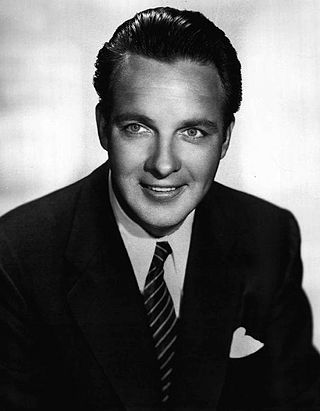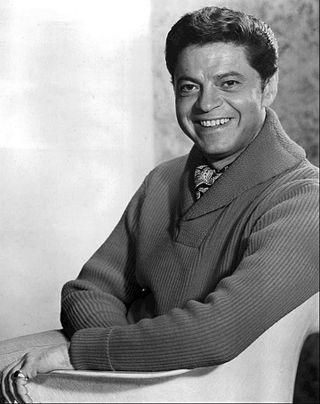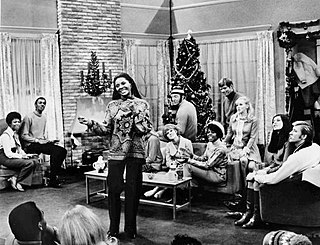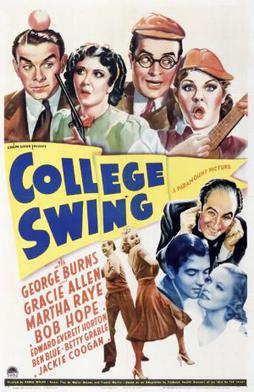This article needs additional citations for verification .(November 2024) |
Swing Out, Sweet Land is a 1970 American TV special starring John Wayne. It was Wayne's first TV special and looked at the history of American settlement. [1]
This article needs additional citations for verification .(November 2024) |
Swing Out, Sweet Land is a 1970 American TV special starring John Wayne. It was Wayne's first TV special and looked at the history of American settlement. [1]
Not all cast members were credited.
The overall theme is pro-United States patriotism, given a light treatment in a series of often-humorous cameo vignettes.
American history is portrayed by a cast of contemporary stars (and others). Wayne is host, leading a star-studded cast of actors, dancers, humorists and musicians, participating in most of the vignettes. As the United States is formed and expanded, Wayne walks a large map on the floor, which shows the growth of the continental United States.
There is a tongue-in-cheek ("yarn-spinning") treatment in most of the scenes, including a running gag originally offered by Bob Hope, regarding Paul Revere: "How he ever got that horse up on the seventh floor, I'll never know!" A number of jokes and puns were references to popular culture of the late 1960s or other anachronisms, such as George Burns, walking through George Washington's inaugural ball in modern clothes and greeting his friend, Jack Benny.
The last few minutes were inspirational words from Wayne, then the stars join in singing God Bless America .
Interiors were filmed at NBC Studios, Burbank, California, some scenes shot before a studio audience. Most location shots were made at and around the Independence Hall and Colonial Village which had been built at Knott's Berry Farm, in Buena Park, California.
It was the highest rated show of the week it aired. [2]

George Burns was an American comedian, actor, writer, and singer, and one of the few entertainers whose career successfully spanned vaudeville, radio, film and television. His arched eyebrow and cigar-smoke punctuation became familiar trademarks for over three-quarters of a century. He and his wife Gracie Allen appeared on radio, television and film as the comedy duo Burns and Allen.

Jack Benny was an American entertainer who evolved from a modest success playing the violin on the vaudeville circuit to one of the leading entertainers of the twentieth century with a highly popular comedic career in radio, television, and film. He was known for his comic timing and the ability to cause laughter with a long pause or a single expression, such as his signature exasperated summation "Well! "

Rowan & Martin's Laugh-In is an American sketch comedy television program that ran for six seasons from January 22, 1968, to March 12, 1973, on the NBC television network. The show, hosted by comedians Dan Rowan and Dick Martin, originally aired as a one-time special on September 9, 1967, and was such a success that it was brought back as a series, replacing The Man from U.N.C.L.E. on Mondays at 8 pm (ET). It quickly became the most popular television show in the United States.

The Sonny & Cher Comedy Hour is an American variety show starring American pop singers Sonny Bono and Cher, who were married to each other at the time. The show ran on CBS in the United States, and premiered in August 1971. The show was cancelled in May 1974, due to the couple's divorce, but the duo reunited in 1976 for the similarly formatted The Sonny and Cher Show, which ran for two seasons, ending August 29, 1977.

The Jack Benny Program, starring Jack Benny, is a radio and television comedy series. The show ran for over three decades, from 1932 to 1955 on radio, and from 1950 to 1965 on television. It won numerous awards, including the 1959 and 1961 Emmy Awards for Best Comedy Series, and is generally regarded as a high-water mark in 20th-century American comedy.

The Dean Martin Show is a TV variety-comedy series that ran from 1965 to 1974 for 264 episodes. It was broadcast by NBC and hosted by Dean Martin. The theme song to the series was his 1964 hit "Everybody Loves Somebody".

George Robert Crosby was an American jazz singer and bandleader, best known for his group the Bob-Cats, which formed around 1935. The Bob-Cats were a New Orleans Dixieland-style jazz octet. He was the younger brother of famed singer and actor Bing Crosby. On TV, Bob Crosby guest-starred in The Gisele MacKenzie Show. He was also a regular cast member of The Jack Benny Program, on both radio and television, taking over the role of bandleader after Phil Harris' departure. Crosby hosted his own afternoon TV variety show on CBS, The Bob Crosby Show (1953–1957). Crosby received two stars on the Hollywood Walk of Fame, for television and radio.

Ross Martin was an American radio, voice, stage, film, and television actor. Martin was best known for portraying Artemus Gordon on the CBS Western series The Wild Wild West, which aired from 1965 to 1969. He was the voice of Doctor Paul Williams in 1972's Sealab 2020, additional characters in 1973's Butch Cassidy and the Sundance Kids, and additional character voices in 1978's Jana of the Jungle.

L.A. Is My Lady is the fifty-seventh and final solo studio album by American singer Frank Sinatra, released in 1984 and produced by Quincy Jones. While the album was Sinatra's last, he recorded five further songs, only four of which have been officially released.

The Doodletown Pipers were a 1960s and 1970s easy listening musical vocal group founded by Ward Ellis, George Wilkins, Bernie Brillstein and Jerry Weintraub.
The Benny Hill Show is a British comedy television show starring Benny Hill that aired on the BBC and ITV between 15 January 1955 and 1 May 1989. The show consisted mainly of sketches typified by slapstick, mime, parody, and double entendre.

Ralph Joseph P. Burns was an American jazz pianist, composer, and arranger.

William Henry Wright was an American actor. He was frequently cast in Westerns and as a curmudgeonly and argumentative old man. Over the course of his career, Wright appeared in more than 200 film and television roles.

The Mad, Mad, Mad Comedians is a 1970 American animated television special produced by Rankin/Bass Productions. After the Christmas special Frosty the Snowman (1969), it was Rankin/Bass' second hand-drawn animated work to be outsourced to Osamu Tezuka's Mushi Production in Tokyo, Japan. The show aired on ABC on April 7, 1970 before the airing of that year's Oscars. It was a tribute to early vaudeville, and featured animated reworkings of various famous comedians' acts.

College Swing, also known as Swing, Teacher, Swing in the U.K., is a 1938 American comedy film directed by Raoul Walsh and starring George Burns, Gracie Allen, Martha Raye, and Bob Hope. The supporting cast features Edward Everett Horton, Ben Blue, Betty Grable, Jackie Coogan, John Payne, Robert Cummings, and Jerry Colonna.
This is a selection of films and television appearances by British-American comedian and actor Bob Hope (1903-2003). Hope, a former boxer, began his acting career in 1925 in various vaudeville acts and stage performances
The Dean Martin Celebrity Roast is an American series of television specials hosted by entertainer Dean Martin and airing from 1974 to 1984. For a series of 54 specials and shows, Martin and his friends would "roast" a celebrity. The roasts were patterned after the roasts held at the New York Friars' Club.
Will Hudson(néArthur Murray Hainer; March 8, 1908 – July 16, 1981) was a Canadian-born American composer, arranger, and big band leader who worked from the mid-1930s through the mid-1950s.
Crowhaven Farm is a 1970 American made-for-television supernatural horror film and folk horror film directed by Walter Grauman and starring Hope Lange, Paul Burke and John Carradine. It originally aired as the ABC Movie of the Week on November 24, 1970.

The George Burns and Gracie Allen Show, was an American situation comedy television series that ran for 291 episodes over eight seasons (1950–58) on CBS. The show did not become weekly until the third season. The first two seasons of the show were biweekly broadcasts, with the last episode of Season Two being broadcast three weeks after the one that preceded it. The show was based on the Burns and Allen radio show (1929–50), which first ran for three years on the BBC radio network, before airing in the United States on CBS and NBC. The radio show itself was based on the characters George Burns and Gracie Allen had developed in vaudeville. Many of the early television episodes were a re-working of the same episodes that had aired on radio.